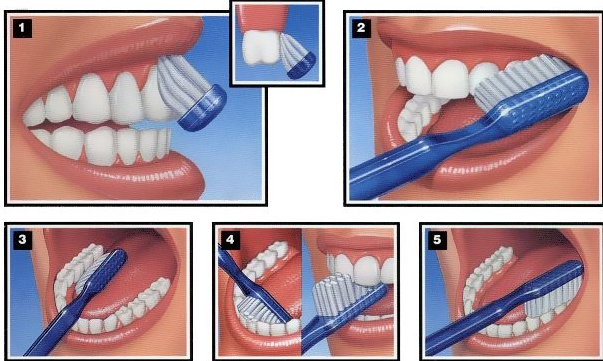Proper Brushing Techniques: Are You Doing It Right?
Oral health is an important part of our overall well-being. However, despite brushing teeth being a daily activity, many people still don’t fully understand the correct tooth brushing technique. Using the wrong technique can lead to dental and gum problems such as cavities, plaque buildup, or even gum disease. To ensure you get the most benefits from your brushing routine, let’s discuss a complete guide on how to brush your teeth correctly.
BODY HEALTHORAL HEALTHPROPER BRUSHING TECHNIQUES
11/11/20243 min read


Why is the Right Tooth Brushing Technique Important?
A vital component of your personal hygiene regimen, brushing your teeth helps keep your mouth clean and guards against gum and tooth problems. To guarantee complete cleaning and prevent harm to your teeth and gums, brushing with the proper technique is crucial. Inappropriate use of the procedure might result in problems such enamel erosion, gum disease, and cavities.
Steps for Correct Tooth Brushing Technique
Here’s the correct tooth brushing technique to maintain healthy teeth and gums:
Choose the Right Toothbrush
Choose a toothbrush with soft bristles and a head size that fits your mouth. A toothbrush with hard bristles can hurt your gums and cause enamel erosion on your teeth.
Replace your toothbrush every three months or when the bristles start to show signs of wear.
Use Fluoride Toothpaste
Fluoride helps prevent tooth decay by strengthening enamel. Choose toothpaste that contains fluoride for extra protection against cavities.
Position the Toothbrush at a 45-Degree Angle
Position the toothbrush at a 45-degree angle to the gum line. This helps remove plaque that accumulates along the gum line.
Brush with Gentle Circular Motions
Use small, gentle circular motions and avoid pressing too hard. Brushing with excessive pressure can damage enamel and irritate the gums.
Brush Every Part of Your Teeth Evenly
Make sure to brush all parts of your teeth: the front, the back, and the chewing surfaces. For the inside of the front teeth, position the toothbrush vertically and make small circular motions.
Don’t Forget to Brush Your Tongue
The tongue can be a breeding ground for bacteria that causes bad breath. After brushing your teeth, clean your tongue with a toothbrush or a tongue cleaner to maintain fresh breath.
Brush for At Least Two Minutes
The ideal time for brushing your teeth is two minutes. You can divide this time into four sections: 30 seconds for each quadrant of your mouth (upper right, upper left, lower right, and lower left).
Rinse Your Mouth Thoroughly
After finishing brushing, rinse your mouth with clean water to remove leftover toothpaste and plaque that has been cleaned off.
Recommended Frequency for Brushing Your Teeth
Experts recommend brushing your teeth at least twice a day: in the morning after breakfast and at night before bed. Brushing in the morning helps clean the plaque that forms during sleep, while brushing at night helps remove food residue and bacteria that accumulate throughout the day.
Tooth Brushing Habits to Avoid
There are some habits you should avoid to maintain good oral health:
Brushing Too Hard
Brushing too hard does not clean your teeth better, but it can damage enamel and cause gum recession.
Neglecting the Gums
Brushing only the tops of your teeth without reaching the gum line can cause plaque to build up around your gums, eventually leading to gum disease.
Brushing with Horizontal Motions
Scrubbing with horizontal motions can damage enamel and gums. Use gentle circular movements, as recommended in the proper tooth brushing technique.
Using a Worn-Out Toothbrush
A toothbrush with worn-out bristles is ineffective at removing plaque and can harm your gums. Be sure to replace your toothbrush every three months or as needed.
Benefits of Brushing Your Teeth with the Right Technique
Brushing your teeth with the correct technique offers several benefits, including:
Preventing Plaque and Tartar Build-Up
Plaque that isn’t removed can harden into tartar, which can only be removed by a dentist. Regular brushing helps prevent the formation of plaque and tartar.
Maintaining Gum Health
The right brushing technique will help keep your gums healthy by cleaning plaque around the gum line.
Reducing the Risk of Bad Breath
Plaque and bacteria on the teeth and tongue can cause bad breath. Brushing your teeth correctly can help maintain mouth cleanliness and fresh breath.
Protecting Tooth Enamel
Using the correct technique and the right toothbrush will protect your enamel from damage, helping to maintain the strength and resilience of your teeth.
Brushing your teeth with the right technique is a simple yet crucial step in maintaining oral health. Choosing the right toothbrush, using fluoride toothpaste, and applying gentle motions are key to keeping your teeth clean without damaging enamel or gums. By brushing for two minutes twice a day and following the guidelines above, you can prevent dental problems and maintain a healthy smile for life.
So, are you brushing your teeth correctly? If not, try applying this technique and feel the difference in your oral health!
FAQ About the Right Tooth Brushing Technique
What should I do if I feel my teeth are still dirty despite brushing them correctly?
If you feel your teeth are still dirty after brushing, you can try using an electric toothbrush or consult with your dentist to ensure your technique is correct.
How long should I brush my teeth?
Brush for two minutes each time to ensure optimal tooth cleanliness.
Is using an electric toothbrush better than a manual one?
An electric toothbrush can provide more consistent pressure and can help clean teeth more effectively, especially if you have difficulty brushing manually.
To maintain optimal oral cleanliness, be sure to use the right toothbrush and toothpaste. Check out our selection of safe and effective oral health products here!
Illustration of Proper Brushing Techniques
